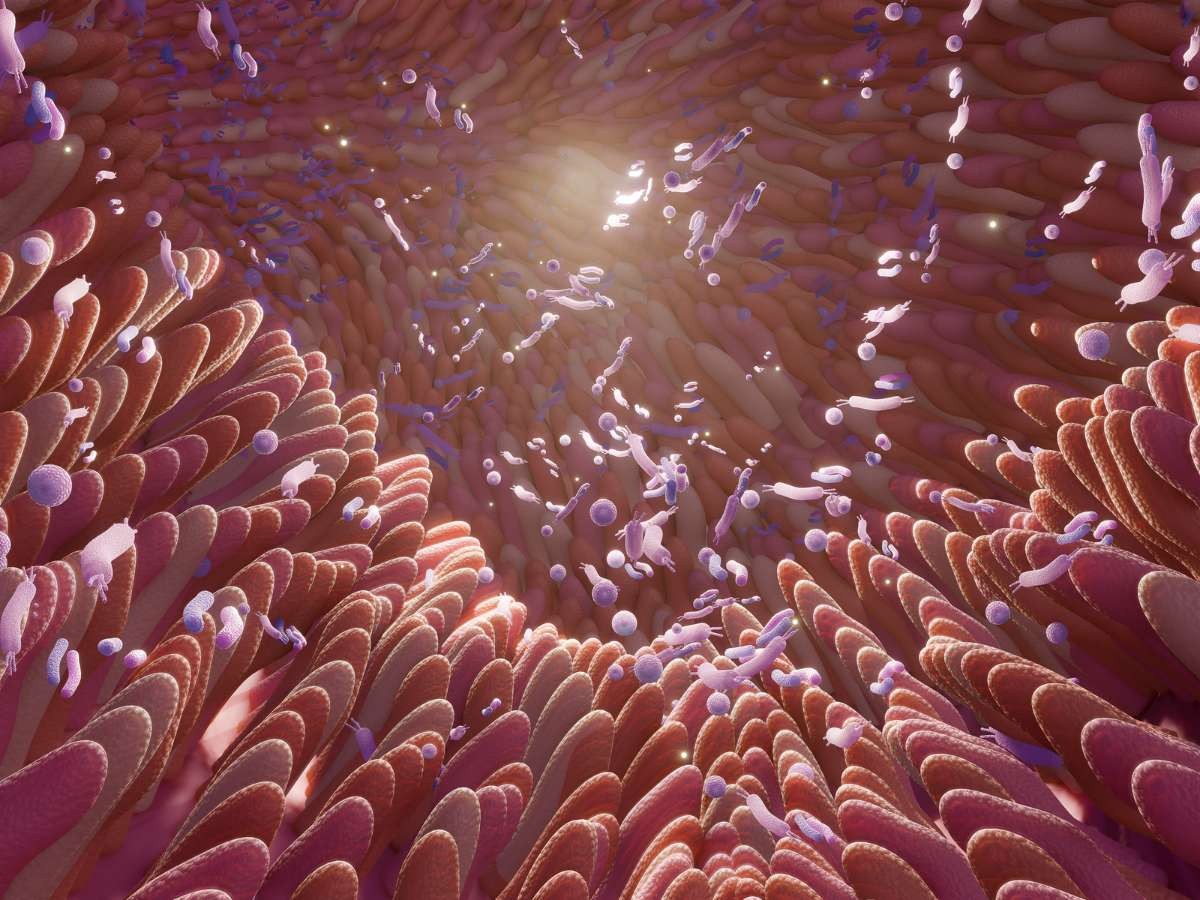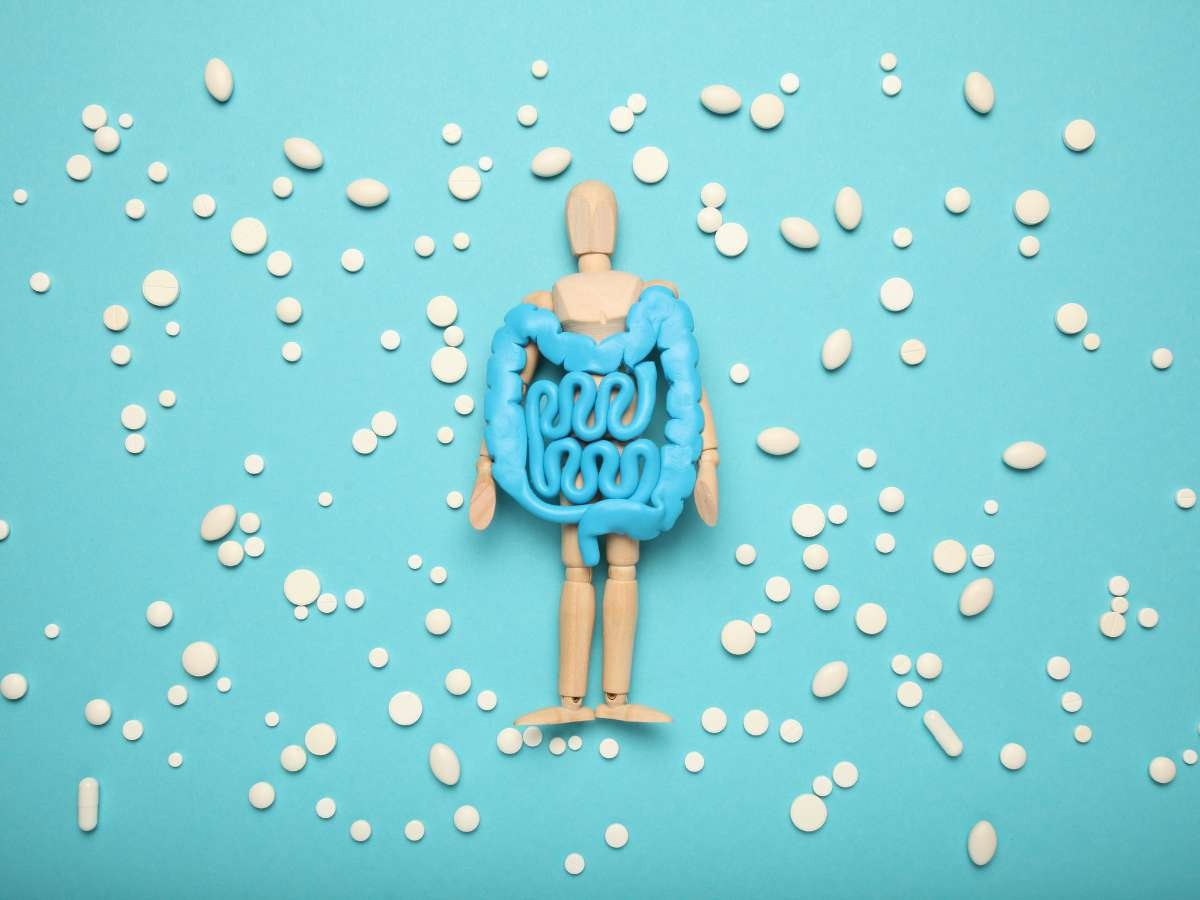Have you ever felt bloated, gassy, or experienced digestive discomfort? You’re not alone. Digestive issues are one of the most common health complaints with 50% of Australian adults experiencing unpleasant gut symptoms each year (1).
One potential solution? Probiotics! These are living microorganisms, such as bacteria and yeast, that can help stimulate digestive health and boost immunity. There are thousands of different probiotic species assisting with a variety of functions living in the body. The most common probiotic bacteria found in various fermented foods, such as yogurt, sauerkraut, kimchi, pickles, as well as in dietary supplements are Lactobacillus and Bifidobacteria (2).
The Importance of Probiotics
Living in your gut are 100 trillion bacteria from 500 different species, housed within a complex community of microorganisms in your gut called the gut flora. They are critical for producing vitamins, destroying harmful pathogens and managing immune cells (3).
However, your gut flora is a fragile and sensitive system, and when the balance is disrupted, it can lead to a range of health concerns, including gastrointestinal issues and autoimmune dysfunction (4). Probiotics can help restore this balance by increasing the diversity of the gut microbiota by introducing beneficial bacteria into the gut.
Maintaining a healthy gut flora with probiotics can make a significant impact on your overall health and wellbeing. This enables you to assist in areas including skin, digestion and immune health, with the latter found to be particularly effective, with probiotics’ innate ability to turn gut fibers into short-chain fats like butyrate, propionate, and acetate. These chemicals play a crucial role in feeding and strengthening your gut wall. This can help prevent the entry of harmful elements into the body and reduce the likelihood of provoking your immune response.
The Effect on Digestive Health
Most of the research into probiotics mainly revolves around digestive health. As probiotics help to restore the natural balance of bacteria in your gut, which can be altered through poor diet or prolonged use of antibiotics (which kill both good and bad bacteria). This leads to a variety of digestive conditions, including diarrhea and constipation (5).
Probiotics can help combat these issues due to their ability to improve nutrient absorption whilst balancing natural microbiota. As probiotics strengthen the gut microbiome, it also helps to break down and absorb nutrients from the foods we digest (6). This can help reduce inflammation in a person’s gut, allowing for greater regulation of bowel movements and reducing gas and bloating.
This is particularly effective in dealing with symptoms of Irritable Bowel Syndrome (IBS), with a 2022 study highlighting that Probiotics have demonstrated benefits for patients with IBS, including slowing down the transit time of the colon, reducing the frequency of bowel movements per day and improving stool consistency (7).

The Rise of Psychobiotics
Despite probiotics being a relatively new concept, scientists have discovered its next frontier. Psychobiotics, which investigates how changes to our gut flora can lead to corresponding changes to our neurochemistry and our mental health and wellbeing. Researchers are dubbing it this relationship the Gut-brain axis (8). A direct communication pathway involving the central nervous system and enteric nervous systems, the latter of which governs digestion.
The gut and the brain communicate with each other and regulate many physiological processes, including digestion, metabolism, and mood function (9). An example is when a person experiences stress, the brain sends signals to the gut, which can result in digestive discomfort or changes in bowel regularity.
If regulated correctly, the gut-brain axis can help alieve health issues, encompassing mood improvement and decreasing stress and anxiety levels. Similar effects were found in a study published by Cambridge University, highlighting that of the 55 male and female volunteers, only the Psychobiotics-treated participants showed significant declines in self-reported negative mood and distress (10).
Final Thoughts
Overall, the field of probiotics holds a lot of potential. With its ability to contribute to multiple health areas, strengthened through the discovery of Psychobiotics leading to new possible applications in the mood and stress spaces. Through its multipurpose nature, the probiotics market is valued at $58 billion (as of 2021) and is expected to rise by a compound annual growth rate of 7.5% by 2030 (11).
Please note that while probiotics are beneficial, they are not a one-size-fits-all solution. Different strains and doses of probiotics may be more effective for specific conditions or individuals. Therefore, consult with a healthcare professional to find what option is right for you and give recommendations regarding suggested dosage and frequency.
If you enjoyed reading this blog, consider joining our mailing list to ensure you are kept up to date with the latest health and complementary medicine news and information. Additionally, if you have any interest in developing your probiotic’s line, contact sales@www.lipa.com.au to learn about the variety of applications available.
Reference List
1. CSIRO. (n.d.). Gut Health and Food. Retrieved from https://research.csiro.au/guthealthco/
2. Healthline. (2021). Probiotics 101: A Simple Beginner’s Guide. Retrieved from https://www.healthline.com/nutrition/probiotics-101#gut-health
3. Collins Cosmetic Clinic. (n.d.). Understanding Probiotics. Retrieved from https://collinscosmeticclinic.com.au/news/general/understanding-probiotics/
4. Fijan, S. (2021). Microorganisms with Claimed Probiotic Properties: An Overview of Recent Literature. International Journal of Environmental Research and Public Health, 18(8), 4151. Retrieved from https://www.ncbi.nlm.nih.gov/pmc/articles/PMC8230287/
5. Optibac Probiotics. (n.d.). Probiotics with Antibiotics: What You Need to Know. Retrieved from https://www.optibacprobiotics.com/learning-lab/in-depth/general-health/probiotics-with-antibiotics#:~:text=when%20taking%20antibiotics-,Can%20I%20take%20probiotics%20with%20antibiotics%3F,alongside%20antibiotics%2C%20rather%20than%20separately.
6. Gomes, A. C., de Sousa Ribeiro, M. S., and de Sousa Ribeiro, M. A. (2014). Etiology, Clinical Presentation and Treatment of Constipation in the Elderly. Arquivos de Gastroenterologia, 51(3), 232–238. Retrieved from https://www.ncbi.nlm.nih.gov/pmc/articles/PMC4049942/
7. Korterink, J. J., Ockeloen, L. E., Benninga, M. A., Tabbers, M. M., and Hilbink, M. (2021). Safety and Efficacy of Probiotics in Children with Functional Abdominal Pain Disorders: A Systematic Review and Meta-Analysis. Journal of Clinical Medicine, 10(9), 1997. Retrieved from https://www.ncbi.nlm.nih.gov/pmc/articles/PMC9116469/#:~:text=Probiotics%20are%20safe%20and%20effective,seem%20to%20show%20greater%20benefits.
8. Sarkar, A., Lehto, S., Harty, S., Dinan, T., Cryan, J., and Burnet, P. (2016). Psychobiotics and the Manipulation of Bacteria–Gut–Brain Signals. Trends in Neurosciences, 39(11), 763-781. Retrieved from https://www.ncbi.nlm.nih.gov/pmc/articles/PMC5102282/.
9. Mayer, E. A., Tillisch, K., and Gupta, A. (2015). Gut/brain Axis and the Microbiota. Journal of Clinical Investigation, 125(3), 926–938. Retrieved from https://www.ncbi.nlm.nih.gov/pmc/articles/PMC4367209/#:~:text=Abstract,brain%20with%20peripheral%20intestinal%20functions.
10. Messaoudi, M., Lalonde, R., Violle, N., Javelot, H., Desor, D., Nejdi, A., … and Cazaubiel, M. (2011). “Assessment of psychotropic-like properties of a probiotic formulation (Lactobacillus helveticus R0052 and Bifidobacterium longum R0175) in rats and human subjects.” British Journal of Nutrition, 105(5), pp. 755-764. Available at: https://www.cambridge.org/core/journals/british-journal-of-nutrition/article/assessment-of-psychotropiclike-properties-of-a-probiotic-formulation-lactobacillus-helveticus-r0052-and-bifidobacterium-longum-r0175-in-rats-and-human-subjects/2BD9977C6DB7EA40FC9FFA1933C024EA [Accessed 5 August 2021].
11. Grand View Research. (2021). “Probiotics Market Size, Share & Trends Analysis Report By Product (Food & Beverages, Dietary Supplements), By Ingredient (Bacteria, Yeast), By Distribution Channel, By End Use, By Region, And Segment Forecasts, 2021-2028.” Available at: https://www.grandviewresearch.com/industry-analysis/probiotics-market [Accessed 5 August 2021].
Work with Australia’s Leading Pharmaceutical Manufacturer
Businesses seeking an alternative pharmaceutical manufacturer in Australia need look no further than Lipa Pharmaceuticals. We are an 8-time winner of Australia’s High Quality Manufacturer Award for complementary medicines and have the capability to manufacture high volumes of vitamins, health food supplements, and over-the-counter medication.
With over 30 years of industry experience and fully-equipped production facilities, we can work with your business to produce custom products in a private label or contract manufacturing arrangement. Get in touch with us today to find out how to partner with our cost-effective pharmaceutical manufacturing solutions in Australia.
